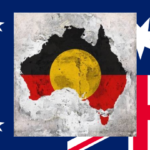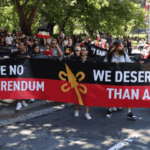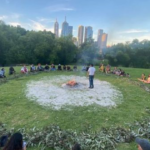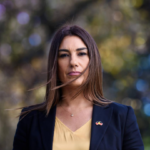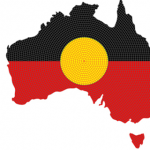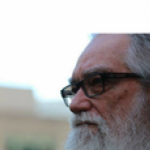“No Jurisdiction Over First Nations”: Jim Everett-puralia meenamatta on Sovereigns of Country
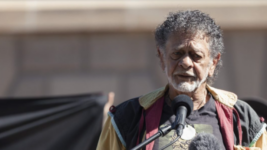
Jim Everett-puralia meenamatta was arrested by Tasmanian police on 19 March 2024 for taking part in a Bob Brown Foundation protest to save the Styx Valley of the Giants, old growth trees situated in southeastern lutrawita-Tasmania, and he was charged under that state’s severe new trespass laws.
Passed by the Rockliff governmen, an 2022 amendment bill inserted section 14B into the Police Offences Act 1935 (TAS), which contains the crime of unlawful entry on land and it was understood to be aimed at cracking down on protesters, especially anti-logging direct actions.
And, in line with the then recently enacted NSW antiprotest regime, the Tasmanian penalties imposed were equally as draconian. And there are a range of different types of trespass offences under the section that carry a variety excessive penalties.
So, section 14B(2AA) involves trespassing with the intent to substantially impede or prevent another person from carrying out lawful work, which is an offence that can be applied to anti-logging actions and can see someone convicted liable to up to 12 months in prison and/or a fine of $10,100.
But if it’s a body corporate that carries out the offence, it can be fined up to $50,500.
A pakana plangermairreenner elder from northeast lutrawita, Everett, now in his early 80s, has been active in preserving the environment his entire life. And on being arrested for trespassing on the land of his ancestors, Everett is taking the opportunity to prove a point to the Australian state.
“We are not Australian citizens”
Everett was served with a charge sheet requiring him to appear in Hobart’s Magistrates Court over his trespassing charge on 3 June, however the pakana plangermairreenner elder didn’t show. And that was because Jim doesn’t consider that the Australian state has jurisdiction over First Peoples.
So, Hobart magistrate Glenn Hay issued an arrest warrant in Everett’s name. But truth be told, puralia meenamatta isn’t too fussed about that either. In fact, it’s part of his plan to highlight to the Australian state that it has no jurisdiction over his people, as they’re the Sovereigns of Country.
The elder with a masters in Aboriginal philosophy points out that at no point has the British Crown or the Australian state attempted to come to any agreement with the First Peoples of the continent or the southern island in regard to their becoming citizens of this entity referred to as Australia.
And Everett, who says they’ll have to drag him into court to get him there, isn’t taking this path just to annoy authorities, rather he’s taking this initial step in refusing to recognise Australian jurisdiction, in order to force the state to admit that this is the truth, and in turn, forge a better future for all.
A common cause
Everett also stressed that the point he’s going to make in the Magistrates Court is just the first step in his truth-telling mission. And it’s not about creating division, rather it’s about saving the planet from the climate crisis and human-caused environmental degradation.
So, in undertaking this task of forcing the Australian state to admit that it has illegitimately imposed its jurisdiction upon First Peoples, he’s aiming to save Country, which is his charge as a Sovereign, but he also stresses the need for white people to take part in the ultimate goal of halting the ecocide.
Sydney Criminal Lawyers spoke to Jim Everett-puralia meenamatta about the Australian state never having come to any agreement with First Peoples in terms of jurisdiction, citizenship and sovereignty and the fact that if the state fails to grasp this point, he’s simply going to keep making it until it does.
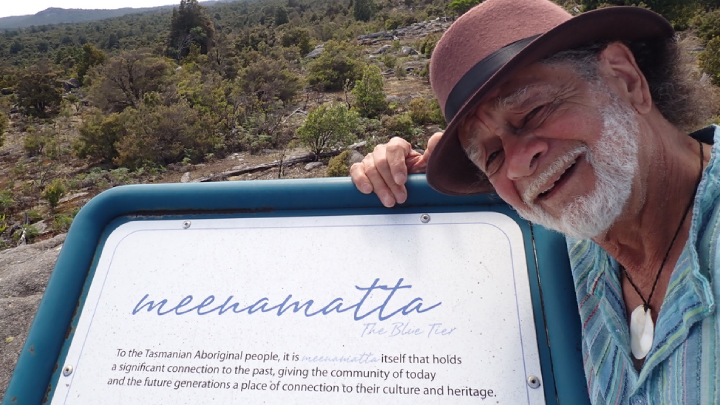
Jim, you were arrested and charged with trespassing in March over an anti-forestry protest in the Styx Valley of the Giants, which was organised by the Bob Brown Foundation.
But you refused to turn up to court, so the magistrate then issued an arrest warrant for you.
So, why didn’t you turn up as required by law?
It’s a colonial court. It’s got no jurisdiction over First Nations people. So, I just didn’t bother going to the court.
And when I do eventually get dragged into a court, I will be standing on my sovereignty because we are not Australian citizens. We have never made any agreements for our people to be Australian citizens.
So, they’ve got no jurisdiction over me.
I’ve notice when you’ve spoken in the press about this, you referred to your matter as if it’s the first stage of an issue that’s going to grow.
And you add that you don’t expect the colonial government is going to take proper notice of what is being put to it the first-time round.
So, what are you envisioning here? Are examples of First Nations peoples no longer recognising the jurisdiction of the British Crown set to become an emerging practice or wider movement?
It depends on what the government does. The first thing I want to do is to get the government to admit that they haven’t made any agreements with us to be Australian citizens, so they don’t have any jurisdiction.
That will change the dynamics of what will be discussed, as the government moves towards treaty with the First Nations of Australia.
So, the most important thing is to confirm what our status is: are we Australian citizens or are we Sovereigns?
And do you consider the example you’re setting might inspire others to do the same and that it becomes something of a movement?
It could do. Unless, the government does tell the truth, and says, “Well, we agree. We haven’t done that, and we’ll make some agreement with you.”
So, that’s what I’m planning to do. To firstly, push the government into telling the truth. And then agree that they need to make some agreement with First Nations people.
And a number of other people may well start doing what I am doing and push it even further until we get the government to admit the truth.
These trespassing laws carry steep penalties of like up to $25,000 dollars?
It’s $45,000. We’re living in a fascist state.
Okay and, as you just said, if they actually want to get you into court over this matter, they’re going to have to take you by force.
But some people might perceive your actions as just a member of the community breaking the law.
I wouldn’t go to a court, or, at least, I wouldn’t do what I am doing and have them drag me into a court over an issue of, say, bad behaviour in public or breaking driving laws and stuff like that.
Those social laws are needed. We can’t take a dispute over social laws – they may need changing and all that – but that isn’t what the fundamental base is.
The fundamental base is, are we Australian citizens or not? And if you say we are, prove it.
I’ve been researching this now since the late 1980s. I’ve got a paper on this issue that’s coming out. It’s being published by the Queensland University Press. I believe it will be published in October.
So, is it the fact that they’re saying you’re trespassing on land: the land of your ancestors?
It’s not as simple as that. If we are going to live by our Aboriginal philosophy, then we must recognise, of course, that our sovereignty is in Country.
That we are Sovereigns of Country. And because we are Sovereigns of Country, we are obligated to protect our sovereignty, because that is our Country.
So, it also has to do with the fact that they’re trying to destroy the land?
That’s right. What they’re doing with destroying… it’s like cultural genocide. They’re killing part of our culture, because we are very much a part of Country and everything that lives here.
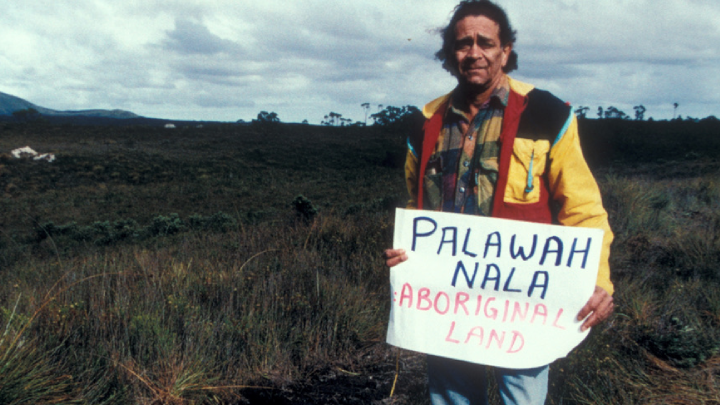
So, going in and destroying a parcel of First Nations Country is like committing a form of cultural genocide upon those people?
That’s right. It most certainly is. And those places where they’re cutting forest down, they’re just a part of a bigger relational ecosystem.
So, all of that relational ecosystem is connected. And when you kill a part of that, you are killing a larger space, than just the space where you took those trees from.
You are interfering with the balance of the ecosystem. They wonder why the world is in such a bloody bad state, well, there’s your reasoning, they’re just breaking the balance of all the ecosystems that are holding things in place and everything feeds everything else.
So, in your mind, what’s going to happen when you put that question to the court?
I don’t expect the court to say anything about it much either. Because it is not in their authority to make a decision about sovereignty or those sorts of things.
All I will do is use the court to force the issue.
And from that point on, is there a direction that you’re hoping that will take?
Yeah, sort of. The first thing will be is I won’t make a plea. I’ll be standing on my sovereignty. And they’ll say, “Alright, we’ll mark you down as pleading not guilty. But you are guilty.” Then they’ll fine me.
So, I will then go straight away and get arrested again, and I’ll be straight back there as soon as possible. And we will start all over again. And I’ll keep pushing them and pushing them.
The government has got to answer this question. The court can’t answer the question. I can’t protest in the same way, but I can challenge their authority because they don’t have jurisdiction, they didn’t make me a citizen.
So, it is your court, you answer the question, the court can’t.
That’s why I can’t plead in the court, because as soon as I plead in the court then I immediately have given them jurisdiction, so the only way that I can overcome that is to say they don’t have any jurisdiction and I make no plea.
And from doing this, what reaction do you expect it to have on others watching you reject Australian sovereignty and its criminal justice system in this manner?
Now, it depends on where you want to start. The rednecks will go off their heads and say I should be hung. There will be those who are sceptics and say this is going to cause division.
And in talking about division. I have made it really quite clear by joining up with the Bob Brown Foundation, The Tasmanian Wilderness Society and Friends of the Greens Party in Tasmanian parliament, that this is not about land titles.
This is about protecting Country. It doesn’t matter if we own it or not. It is our matter. Our sovereignty is there. And everyone else, we’ve got to take them with us.
If we want this world to protect Country, or Australia to protect Country or at least Tasmania, to protect our forests and stop polluting our waters, we’ve got to take white people with us.
If we don’t, it won’t happen. No change can happen unless we take them with us.
This is not about division. This is about bringing all people together and saying, “Look. We will all go in this direction. And you’ll follow our philosophy and that’s how we change this country.”
So, that’s how I’m seeing it.
And lastly, Jim, what sort of system is going to make this come about, with establishing treaties and moving forward from there? How is this going to occur?
The first thing would be to establish a commission to develop the process for a treaty, which we’ve already done down here. Michael Mansell has already got a bill being introduced into parliament this week by the Greens.
It’s a bill to establish a commission to prepare a process for a treaty. That’s about the first way it should start.
And it should be led by First Nations people. It shouldn’t have any government people involved in it. They aren’t the ones making the treaty. We are.
This is our Country. We make the treaty. Not the colonials. They don’t make treaties with us. We make the treaty.
Otherwise, it would be like going to the government like welfare recipients and saying, “Oh, please give us a treaty.” That’s like asking the cops to investigate some misdemeanour they did.
So, that’s the major thing: we take everybody with us. That we work together not only to take care of this country and respect it but to build a better society, because it’s no good the way it is.
It’s a total bloody failure this colony.


